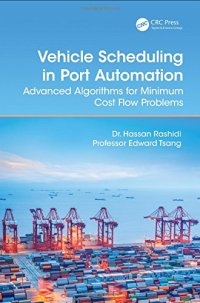
Ebook: Vehicle Scheduling in Port Automation: Advanced Algorithms for Minimum Cost Flow Problems, Second Edition
Author: Hassan Rashidi Edward Tsang
- Tags: Drafting Presentation Architecture Arts Photography Production Operations Management Leadership Business Money Purchasing Buying Processes Infrastructure Systems Analysis Design Computer Science Computers Technology CAD Solidworks Graphics Finance Accounting Banking Communication Development Ethics Law Economics Entrepreneurship Human Resources International Investments Securities Marketing Real Estate Sales New Used Rental Textbooks Specialty Boutique Algorithms Artificial Intelligence Database
- Year: 2015
- Publisher: CRC Press
- Edition: 2
- Language: English
- pdf
Container terminals are constantly being challenged to adjust their throughput capacity to match fluctuating demand. Examining the optimization problems encountered in today’s container terminals, Vehicle Scheduling in Port Automation: Advanced Algorithms for Minimum Cost Flow Problems, Second Edition provides advanced algorithms for handling the scheduling of automated guided vehicles (AGVs) in ports.
The research reported in this book represents a complete package that can help readers address the scheduling problems of AGVs in ports. The techniques presented are general and can easily be adapted to other areas.
This book is ideal for port authorities and researchers, including specialists and graduate students in operation research. For specialists, it provides novel and efficient algorithms for network flow problems. For students, it supplies the most comprehensive survey of the field along with a rigorous formulation of the problems in port automation.
This book is divided into two parts. Part one explores the various optimization problems in modern container terminals. The second part details advanced algorithms for the minimum cost flow (MCF) problem and for the scheduling problem of AGVs in ports.
The book classifies optimization problems into five scheduling decisions. For each decision, it supplies an overview, formulates each of the decisions as constraint satisfaction and optimization problems, and then covers possible solutions, implementation, and performance.
The book extends the dynamic network simplex algorithm, the fastest algorithm for solving the minimum cost flow problem, and develops four new advanced algorithms. In order to verify and validate the algorithms presented, the authors discuss the implementation of the algorithm to the scheduling problem of AGVs in container terminals.